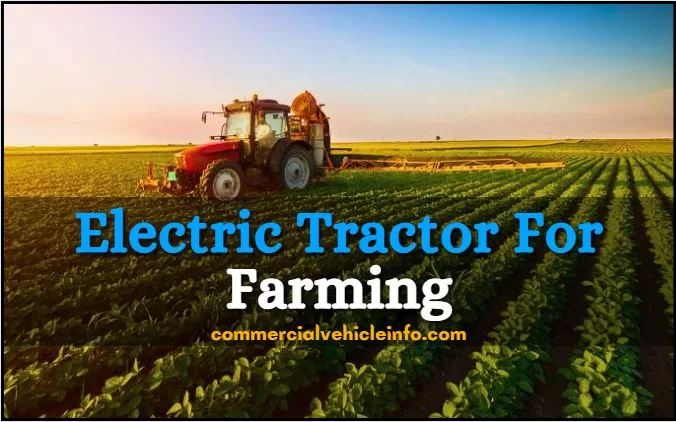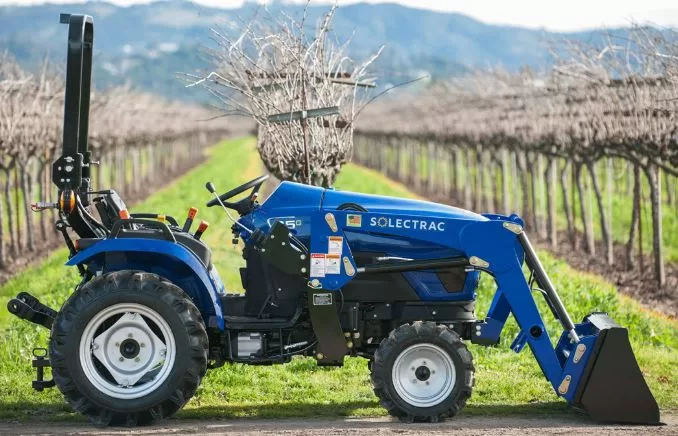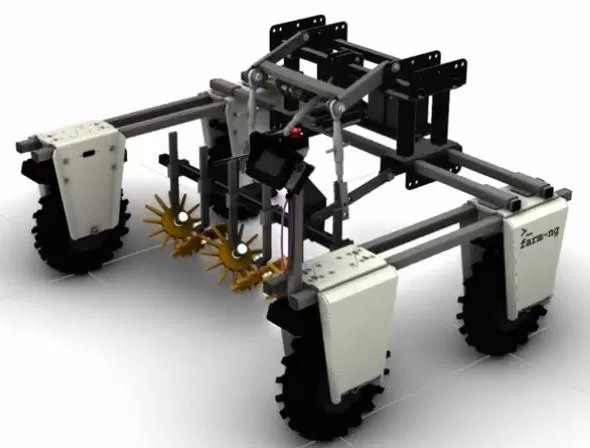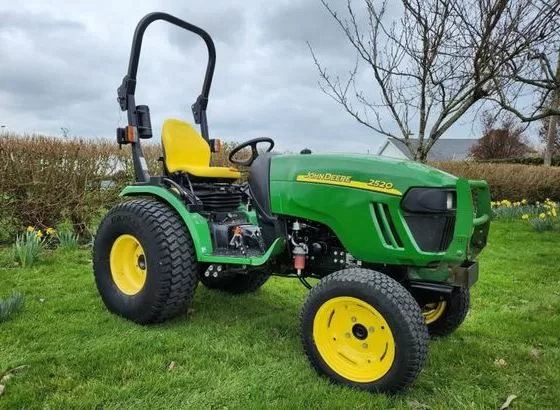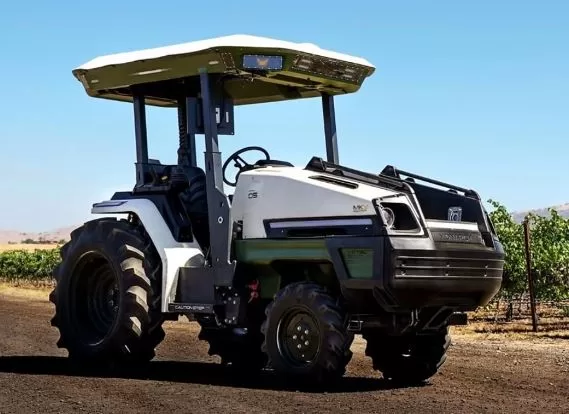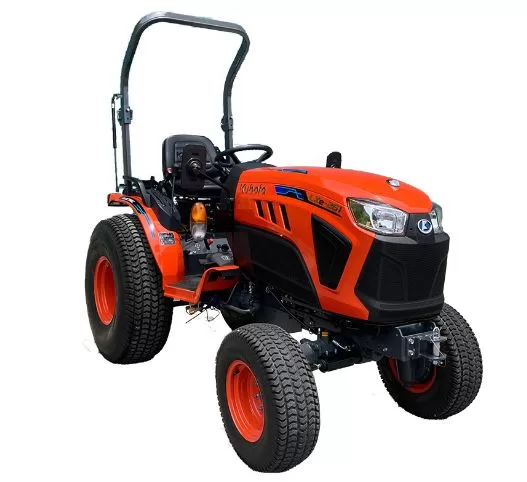Electric Tractor For Farming: The agriculture industry is changing as sustainable practices are taking center stage. One of the most innovative innovations that is driving this shift is electric tractors.
By reducing emissions, lowering operating expenses, and providing the latest technology electric tractors are revolutionizing the way that farming is conducted.
This article will delve into the advantages, features, and considerations of adopting electric tractors to farms.
Best Electric Tractor For Farming
There are many electric tractors on the market for use in farming. Here are the top electric tractors for farmers in relation to their characteristics and performance:
- Solectrac e25 Electric Tractor: The E25 is a multi-functional, 4WD compact tractor perfect for golf courses, hobby farms as well as municipal facilities, and equestrian centers. It’s driven by electric power.
- Amiga Robotic Micro-Tractor: The Amiga can be described as a robot micro-tractor that gives small-scale farmers an affordable alternative. This tractor is ideal to be used for farming on a small scale. It can be operated by itself.
- Monarch Tractor: Monarch Tractor is the creator of the world’s first electric tractor that can be operated by a driver. It was created to make sustainable farming economically efficient and is dedicated to advancing farming practices to provide clean, efficient economically viable options for farmers today and generations to follow.
- John Deere GridCON Electric Tractors: John Deere GridCON is working on electrical tractors, which will be more efficient and quieter as well as much more effective than diesel tractors. They reduce the cost of oil, fuel DEF, fuel, etc.
- Kubota Electric Tractor: Kubota has unveiled a fully autonomous, 100% electric concept tractor. They are also researching the possibility of AI-controlled driverless tractors. In 2022, Kubota introduced the LX electric tractor, which brings cost-reduced maintenance needs and cost savings on maintenance and fuel
What are the Types of Electric Tractors available for farming?
- Tractors Powered By Batteries: These electric tractors run on rechargeable battery power. They are emission-free as well as quiet operation as well as high efficiency. The energy stored in batteries is directly used to drive the tractor, which results in very little energy waste.
- Plug-in Hybrid Tractor: Plug-in hybrid tractor models incorporate electric power along with diesel engines as a backup. They offer the advantages of an extended range and the capability to switch to a diesel engine if needed. They are therefore suitable for jobs that require greater power and longer running times.
- Automated Electric Tractors: Electric tractors that are autonomous come with the latest technology that lets them work without the intervention of humans. They are able to perform tasks like plowing, harvesting, and planting in a completely autonomous manner. They can increase efficiency and effectiveness.
- Small-scale Electric Tractors: These Electric tractors have been designed for small-scale farming. They are small and versatile, which makes them perfect for tasks like planting seeds, weeding, or repair of equipment. They’re usually less expensive and are easier to maneuver in tight areas.
- Robotic Electric Tractor: Robotic electric tractors are fitted with artificial intelligence and automated capabilities. They can complete tasks on their own and are designed to maximize efficiency and accuracy. They are great in precision agriculture and aid in reducing labor costs.
- Batteries Electric Tractors Designed for Organic Farming: Battery electric tractors (BETs) are designed specifically to support organic farming methods. They provide advantages like increased conversion efficiency, greater torque, and lower emissions of exhaust compared to diesel-powered tractors. BETs are eco-friendly and are in line with sustainable agricultural practices.
What are the benefits of using electric tractors for farming?
- Environmentally friendly: Electric tractor engines are non-emission and help reduce the need for fossil fuels, which makes them a greener option for agriculture.
- Effectiveness and cost: Electric tractor models are less expensive to operate than gasoline or diesel-powered tractors with less energy consumption and lower maintenance costs.
- Enhances the user Experience: Electric tractor has smoother and faster acceleration, resulting in the most comfortable experience for the user. In addition, the absence of exhaust emissions and engine noise makes the operation a pleasant experience.
- Sources of renewable energy: Electric tractor batteries can be charged with renewable energy sources like wind and solar power, which allows farmers to become self-sufficient and less reliant on fossil fuels.
- Sustainable scaling: Electric tractors can help reduce the ecological impact of farming and encourage sustainable practices like making use of renewable energy sources and cutting emissions.
- Increased the productivity of your business: Electric tractors can enhance productivity by reducing time to repair and maintenance and also by offering an improved and comfortable operation for the operator.
Solectrac E25 Electric Tractor
This Solectrac Electric tractor e25 is a small and versatile tractor that is designed for small-scale vineyards, farms sporting fields, golf courses Equestrian centers, and municipal.
It’s powered by an electric 25-horsepower motor with a 4WD hydrostatic transmission. The tractor is equipped with a loader as well as an MFWD (Mechanical Front Wheel Drive) and can be used with all PTO (Power Take-Off) tools.
The e25 is able to run for a full charge from a 22 kWh battery pack, based on the amount of load. It will be available to purchase from 2023.
New Solectrac Electric Tractor Price
New Solectrac E25 Electric Tractor Price: $29,249
Solectrac Electric Tractor Specifications
| Specification | Value |
|---|---|
| Horsepower | 25 hp |
| Torque | 100 lb-ft |
| Top speed | 25 mph |
| Range | 3-6 hours |
| Battery | 48 kWh Lithium-ion battery |
| Charging time | 6-8 hours |
| Weight | 3,000 lbs |
| Width | 54 inches |
| Length | 96 inches |
| Height | 84 inches |
| Ground clearance | 12 inches |
| Lift capacity | 1,000 lbs |
| PTO | 540 rpm |
| Implements | Category 1N/1 |
Amiga Robotic Micro-Tractor
It is the Amiga Robotic Micro-Tractor can be described as an all-electric, modular system specifically designed to aid farms of any size.
It’s a light option compared to a compact cultivating tractor, which makes it ideal for smaller-scale operations in which seeding, planting cultivation, as well as harvesting could be a bottleneck to productivity.
It is capable of Amiga can turn-in-place, haul, raise, and transport tools, cultivate, as well as be able to integrate into all cropping systems in a farm. It can run between 3 to 8 hours based on payload, use, and terrain.
New Amiga Robot Micro-Tractor Price
Amiga Robot Micro-Tractor Price: $12,990
Amiga Robot Micro-Tractor Specifications
| Specification | Value |
|---|---|
| Model | Amiga Robot Micro-Tractor |
| Powertrain | 4×4 all-electric skid-steer platform |
| Motors | 4x 250-500watt sealed brushless DC geared motors |
| Torque | 140nm peak torque for a total of 2-3hp electric equivalent |
| Battery | 48V 20Ah lithium-ion battery |
| Range | Up to 6 hours |
| Charging time | 4-6 hours |
| Weight | 300 lbs |
| Payload capacity | 500 lbs |
| Dimensions | 48″ L x 36″ W x 24″ H |
| Features | Autonomous operation, precision agriculture, data analytics |
John Deere Electric Tractor
John Deere has been investing in the development of electric tractors in their efforts to develop the future of technology for farming.
This electric tractor is built upon the John Deere 1R series and features a powerful PTO that allows more than 10,000 square meters of lawns to be mowed using a single battery charge that lasts 4.5 hours.
The tractor is equipped with a capacity of 500 kW. It can be fitted with tracks or wheels. Electric tractor boasts a total power of 400.
John Deere also has diesel engine tractor models, like the compact utility tractor 4052R that comes with the Yanmar diesel engine that has an extremely high torque reserve that gives ample power even under the rigors of heavy loads.
New John Deere Electric Tractor Price
John Deere Electric Tractor Price: $500,000+
John Deere Electric Tractor Specifications
| Specification | Value |
|---|---|
| Model | John Deere e1850 |
| Powertrain | Electric |
| Motor | 185 horsepower electric motor |
| Battery | 60-kilowatt-hour battery |
| Range | Up to 10 hours |
| Charging time | 6-8 hours |
| Weight | 10,000 lbs |
| Payload capacity | 5,000 lbs |
| Dimensions | 18′ L x 10′ W x 10′ H |
| Features | Autonomous operation, precision agriculture, data analytics |
Monarch Electric Tractor
Monarch Tractor is a mission-driven company that offers economic and sustainable solutions to farmers by enhancing the quality of their farming practices.
The Monarch Tractor is the first driver-optional, fully electric tractor called the MK-V which is a combination of the power of automation, and electrification with data-driven analysis, to assist producers reduce carbon emissions, enhance the safety of their fields and boost productivity.
The MK-V tractor is 100% electric, driver-optional, and data-driven. It has a production of up to 40HP continuously as well as 70HP peak and a whole day of running time on one charge.
New Monarch Tractor Price
Monarch MK-V Tractor Price: $88,998
Monarch Electric Tractor
| Specification | Value |
|---|---|
| Powertrain | 4×4 all-electric platform |
| Motors | 4x 75hp electric motors |
| Torque | 1,500ft-lbs |
| Battery | 120kWh lithium-ion battery |
| Range | Up to 12 hours |
| Charging time | 6 hours |
| Weight | 8,000 lbs |
| Payload capacity | 5,000 lbs |
| Dimensions | 108″ L x 72″ W x 96″ H |
Kubota Electric Tractor
Kubota is working on electric tractor development as part of their plan for the next generation of farming.
They have revealed a fully electronic, completely autonomous concept tractor that is paving the way to an agricultural future by utilizing modern technology.
Kubota is also studying the possibilities of autonomous driverless tractors.
The tractor is compact in size allows it to operate efficiently in areas that are narrow and low. It is able to work for 4 hours on one charge and can be quickly recharged.
New Kubota Electric Tractor Price
Kubota LX Electric Tractor Price: $19,137.00
Kubota Electric Tractor Specifications
| Specification | Value |
|---|---|
| Model | Kubota LX2500E |
| Powertrain | 48V AC electric motor |
| Torque | 47 ft-lb |
| Battery | 48V 300Ah lithium-ion battery |
| Range | Up to 5 hours |
| Charging time | 8 hours |
| Weight | 3,200 lbs |
| Payload capacity | 2,500 lbs |
| Dimensions | 107″ L x 69″ W x 79″ H |
| Features | 4WD, PTO, hydraulics |
What are the Challenges faced by Electric Tractors in the agriculture sector?
Electric tractors bring forth numerous advantages within the realm of agriculture, yet they also grapple with a set of challenges.
Below are some of the obstacles confronted by electric tractors in the agricultural sector:
- Restricted Battery Lifespan: One of the foremost predicaments for battery-powered tractors revolves around the current energy capacity of available batteries, especially when juxtaposed with the energy demand of typical farming operations. Most electric tractors can operate for a span of 4 to 8 hours on a single charge, which might fall short for extended workdays.
- Sparse Charging Infrastructure: The successful operation of electric tractors hinges on the presence of adequate charging infrastructure, making them less viable for remote locales bereft of charging stations. Farms situated in remote areas encounter challenges in establishing electric charging or hydrogen refueling stations due to their geographical isolation.
- Elevated Initial Costs: Electric tractors command a higher price tag in comparison to their diesel counterparts, with price ranges spanning from $50,000 to $100,000. This substantial upfront expenditure could impede their adoption among certain farmers.
- Compatibility with Agricultural Machinery: Ensuring the compatibility of electric tractors with prevailing farm equipment, encompassing components like the three-point hitch, hydraulic remote valves, and power take-off (PTO), presents a notable hurdle. Some farmers possess existing equipment that might not seamlessly integrate with electric tractors, posing a challenge in their adoption.
- Constrained Power Output: The power output of electric tractors carries significant significance, as it dictates their efficacy in handling arduous tasks. For tasks demanding substantial power, hybrid tractors that amalgamate both electric and diesel propulsion stand as a more suitable option.
Are government incentives available for adopting electric tractors?
There are incentives offered by the government available to adopt electric tractors. A number of governments across the world provide incentives to farmers who decide to make the switch to electric tractors including tax credits and subsidies.
However, it’s not known what federal incentives are for those farmers across the United States looking to defray the costs of electric tractors.
However, the savings that come with electric tractors makes them financially appealing to farmers who want to maximize their operating costs and ensure long-term financial stability.
What does the Future of Electric Tractors in Farming?
Electric-powered tractors have become more well-known in the agriculture industry because of their low cost in addition to their environmental sustainability and easy maintenance.
Below are some possible changes that could affect how electric tractor technology will develop in agriculture:
- Adoption is increasing: As awareness of environmental concerns and the need for sustainable solutions continue to expand electric tractors are increasingly appealing to farmers and businesses. The potential benefits that electric tractors may bring to the field could change the way farmers run their farms.
- Costs Reduced: Electric tractors offer farmers substantial savings on fuel throughout the lifetime of the machine as compared to a diesel-powered tractor. Furthermore, battery can charge through renewable energy sources like wind or solar power, for a lower operating cost.
- Better battery Technology: Battery technology is growing rapidly, resulting in longer battery life and quicker charging times. This can help address the problem of battery lifespan which is a major issue for electric tractors.
- Government Incentives: The governments of the world are offering incentives to farmers to make the switch to electric tractors, including tax credits and subsidies. This will assist in addressing the issue of expensive upfront costs, which are one of the main obstacles to adopting.
- Autonomous Electric Tractor: There is the potential for autonomous electric tractors that could further cut down on labor costs and greenhouse emissions. This could transform how farmers manage their operations, making it possible to adopt more sustainable and efficient farming methods.
Electric Tractor for Farming Review
Electric tractors are gaining popularity as a more sustainable and environmentally friendly alternative to traditional diesel tractors. They offer several advantages over their diesel counterparts, including:
Reduced Emissions: Electric tractors produce zero emissions, contributing to improved air quality and a reduced environmental impact in farming.
Lower Noise Levels: Electric tractors operate with significantly less noise compared to diesel tractors, making them a valuable choice for farmers near residential areas or those concerned about noise pollution.
Lower Operating Costs: Electric tractors have fewer moving parts than diesel tractors, leading to reduced maintenance requirements and a lower likelihood of breakdowns. Additionally, the cost of electricity is typically lower than that of diesel fuel.
Improved Performance: Electric tractors can provide instant torque, a valuable feature for tasks such as pulling heavy loads or working in challenging terrains.
As these advantages continue to gain recognition, electric tractors are increasingly seen as a beneficial and sustainable option for modern agriculture.
Full review YouTube video check here.
Conclusion
The emergence of electric tractors marks a pivotal moment in the history of farming. With their numerous advantages, from environmental benefits to cost savings, these vehicles are poised to transform the way agriculture is practiced.
As technology advances and challenges are overcome, electric tractors are likely to become an integral part of modern farming, promoting sustainability and efficiency.
For more details visit the commercialvehicleinfo.com.
Electric Tractor for Farming FAQs
The battery life of an electric tractor depends on the battery capacity and usage. Most electric tractors have a range of 4-8 hours on a single charge.
Yes, electric tractors can be used for heavy-duty farming tasks. Hybrid tractors, which combine electric and diesel power, are better suited for heavy-duty tasks.
Electric tractors require charging infrastructure, so they may not be suitable for remote areas without access to charging stations. However, solar-powered tractors can provide a sustainable source of energy in remote areas.
The battery capacity determines the range and power output of the electric tractor. A higher battery capacity means a longer range and higher power output.
Charging times vary depending on the battery capacity and charging infrastructure. Most electric tractors can be fully charged in 4-8 hours.
Electric tractors have zero emissions, making them much more environmentally friendly than diesel tractors. They also reduce the carbon footprint of farming operations.
Yes, electric tractors can be used in all weather conditions, as they are designed to withstand harsh conditions.
Electric tractors are much cheaper to operate than diesel tractors, with lower fuel and maintenance costs.
The lifespan of an electric tractor depends on the battery and motor. With proper maintenance, an electric tractor can last for many years.
Yes, electric tractors can be used with other farm equipment, as long as they are compatible and have the necessary power output.
The warranty on an electric tractor varies depending on the manufacturer and model. Most electric tractors come with a warranty of 1-3 years.
